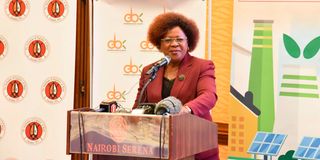Kenyans to pay higher tariffs for water from 100 dams to be built

Water, Sanitation and Irrigation Cabinet Secretary Alice Wahome on Monday during the media launch of the 29th Institute of Engineers of Kenya Convention scheduled for November 21–25, 2022 in Mombasa County.
Kenyans waiting for the 100 dams President William Ruto has promised to build should prepare to pay more for water.
The government explained that the dams will be constructed under Public-Private Partnerships (PPPs), letting private sector players recover their money through water tariffs. It is expected that because private sector players will be out to make money, the tariffs will be higher than the normal levies.
In the past, the government would build dams and other water infrastructure using taxpayer money or funding from donors and development partners, and then locals (usually the main beneficiaries) would pay annual levies.
In Kirinyaga, for instance, rice farmers pay Sh3,000 per acre to the Water Resources Management Authority for irrigation water. A proposal to raise the levy to Sh15,000 elicited sharp criticism from the farmers in April.
Under the new framework, the more expensive a dam is, the higher the tariff, Water Cabinet Secretary (CS) Alice Wahome has said. “We have identified and earmarked where the dams will be. For most of the dams that we have identified, the survey, data, and drawings are all in place. What we need is professional skills, technical knowledge, personnel, and availability of professional support,” she said.
Availability vs cost
Speaking in Nairobi as she lobbied engineers to get on board as part of the private investors’ group to put in cash and skills during construction, Ms Wahome said the Ruto administration was more concerned about the availability of water than the cost element.
“Don’t get worried about the issue of the water being expensive because there is also a regulative body that will deal with tariffs. We cannot worry about the cost of a commodity that we don’t have. We must first develop the commodity, develop the water resources, have it, and then discuss how much we shall sell it. The rates are different depending on the structure cost, but we should not say that the PPP is likely to take the prices high. That is worrying about something that you don’t have.”
Stating that the public will be involved in deciding how much beneficiaries will pay for water, she also made it clear that construction costs will be a key determinant. Ms Wahome said private investors have been knocking on the doors of the Water ministry and the President’s office asking to be allowed on board.
PPP model
The UK government last week told the Nation that water tariffs would be applied in the Sh425 billion Grand High Falls Dam, in which it has partnered with Kenya on a PPP model. Water users will pay for the resource to enable private investors to recover their cash.
“A water purchase agreement is a new structure that the government is keen to pioneer in Kenya, under which the dam project will provide irrigation water for farmland, and use the fees for irrigation to repay the privately raised funds to finance the construction of the dam,” the UK High Commissioner said.
A source from the Water ministry yesterday told the Nation the proposal had caused unease in some quarters, with some arguing that water is a basic necessity to which all Kenyans are entitled.
“For a long time, private sector players have wanted to venture into this business but the government rejected it because it did not want to be seen to be doing business with its own people,” the source said.
Ms Wahome said the government is in the final stages of the proposed projects and that their launching is “just about to happen”.
The CS lobbied local engineers, through the Institute of Engineers of Kenya (IEK), to join in the construction of the dams, which will range from small pans costing below Sh500 million to mega dams costing over Sh1 billion.
“We need to ensure that the agreements capture the local content, and definitely that is where you (local engineers) will come in in a bigger way so that we are not leaving it to everybody outside there, save for Kenyans,” she said.
She also asked the National Land Commission not to be an impediment through slow compensation to households where the projects will be undertaken.





